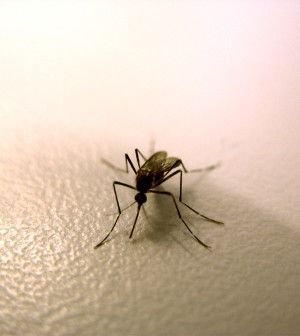- Could Your Grocery Store Meat Be Causing Recurring UTIs?
- Are You Making This Expensive Thermostat Error This Winter?
- Recognizing the Signs of Hypothyroidism
- 10 Strategies to Overcome Insomnia
- Could Artificial Sweeteners Be Aging the Brain Faster?
- Techniques for Soothing Your Nervous System
- Does the Water in Your House Smell Funny? Here’s Why
- Can a Daily Dose of Apple Cider Vinegar Actually Aid Weight Loss?
- 6 Health Beverages That Can Actually Spike Your Blood Sugar
- Treatment Options for Social Anxiety Disorder
Combo Treatment Protects Pregnant Women, Fetuses From Malaria in Study

A combination drug therapy widely used to treat malaria in adults also protects pregnant women and their fetuses from the disease, according to a new study.
Malaria is a leading cause of premature birth, low birth weight and death among infants in Africa, the researchers said.
Most Africans develop immunity to malaria by adulthood, but women lose some of this immunity during pregnancy and are given drugs to prevent infection. The recommended preventive drug is sulfadoxine-pyrimethamine (SP), but the mosquito-transmitted parasite that causes malaria is often resistant to it.
Researchers assessed whether the combination therapy dihydroartemisinin-piperaquine (DP) — commonly used to treat malaria in adults — could prevent malaria in pregnant women.
The study included 300 pregnant women in Uganda. Beginning in the 16th week of pregnancy, about one-third of the women received three doses of SP, one-third received three doses of DP and one-third received monthly doses of DP.
Evidence of malaria infection was found in half the women who were given SP, compared with 34 percent who had three doses of DP, and 27 percent who had monthly doses of DP.
Forty percent of the women who received SP had malaria parasites in their blood, compared with 17 percent of those in the three-dose DP group and 5 percent in the monthly DP group. None of the women in the monthly DP group developed malaria, compared with 41 of the 106 in the SP group.
The study, published in the March 10 issue of the New England Journal of Medicine, was not designed to test the effectiveness of SP, but the findings suggest the treatment is losing its effectiveness, the researchers said.
“The malaria parasite’s resistance to SP is widespread, especially in sub-Saharan Africa. But we are still using the same drugs, because we have no better alternatives,” study first author Dr. Abel Kakuru said in a University of California, San Francisco news release. Kakuru is an epidemiologist with the Infectious Diseases Research Collaboration in Kampala, Uganda.
DP is considered safe for adults, but this study was not large enough to determine whether it is safe for pregnant women or reduces pregnancy/birth complications, the researchers noted. The World Health Organization would need such confirmation to recommend the use of DP instead of SP.
“People are very cautious about giving drugs during pregnancy. You don’t want to take any chances that it’s going to do something bad to the fetus or to the mother,” study senior author Dr. Grant Dorsey, a professor of medicine at UCSF, said in the news release.
The U.S. National Institutes of Health funded the study.
More information
The American Academy of Family Physicians has more on malaria.
Source: HealthDay
Copyright © 2026 HealthDay. All rights reserved.










